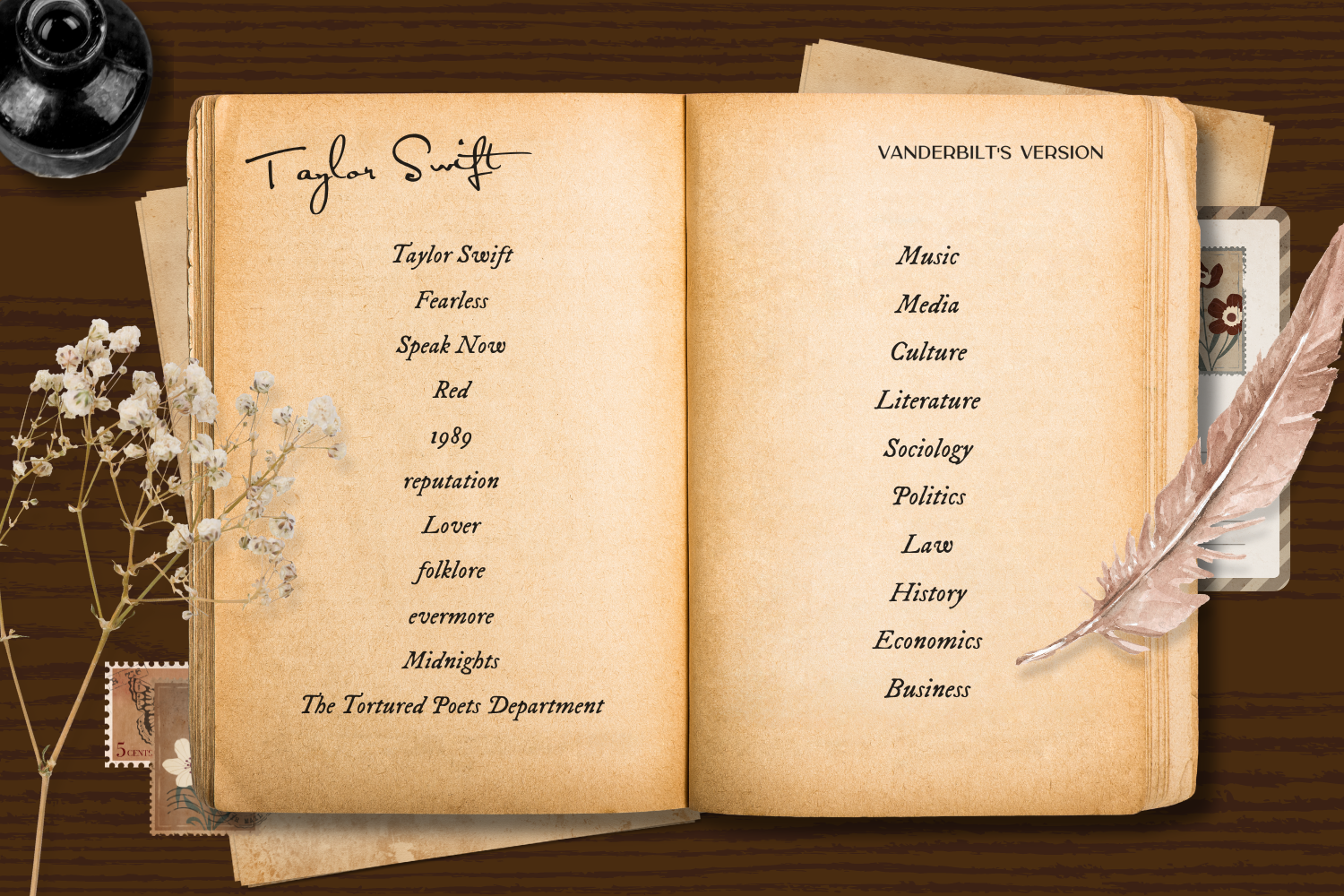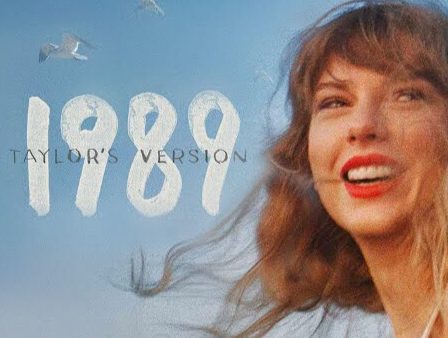Crowned TIME Magazine’s 2023 Person of the Year, Taylor Swift undoubtedly stands among the greats of music. In 2023 alone, Swift rose to new heights: she was both Spotify and Apple Music’s top artist of the year, and her Era’s Tour holds the Guinness World Record for the highest-grossing music tour of all time.
Swift’s ten studio albums and four re-recorded albums have gained critical acclaim and amassed extraordinary commercial success. And she is not slowing down. Her eleventh studio album, “The Tortured Poets Department,” and a surprise second album released today are a master-class in synergies, becoming the most streamed album in a single day in Spotify history, extending Swift’s imperial legacy. To this day, Swift remains the only artist to have ever occupied all of the top ten spots on Billboard’s Hot 100 simultaneously with her album “Midnights.” She is well-known for the blurring of genre boundaries, traversing between country, pop and indie, among others. Her powerful and cathartic lyricism, connection with her fans and avant-garde artistry has enshrined Swift as a cultural icon, akin to the likes of Shakespeare and the Beatles.
Taylor Swift’s “The Era’s Tour” drew record-breaking numbers for fan attendance and consumer spending on hotels, transportation and food. She gained widespread critical acclaim for the tour’s blockbuster production, unparalleled showmanship and masterful storytelling. She is recognized for revitalizing local economies at every stop of her tour, with the U.S. Travel Association estimating the aggregate economic impact to be over $10 billion!
Just as Vanderbilt has offered courses in the past exploring the life and times of other cultural greats, such as Ernest Hemingway and Oscar Wilde, I think it’s about time we pay a similar tribute to one of this generation’s most influential artistic trailblazers: a course dedicated to Taylor Swift. Given Swift’s stratospheric level of success and her strong connection to Nashville, it only makes sense that Vanderbilt offers a groundbreaking course on Swift.
Even as Swift continues to gain global recognition, her musical roots are firmly planted in Vanderbilt’s beloved home of Nashville. As a young artist, Swift and her mother drove along Music Row, submitting demos to record labels. Tennessee hotspots have been featured in abundance in Swift’s discography — for instance, her song “invisible string” features mentions of Centennial Park. She even recorded a music video for her song “The Story of Us” in Vanderbilt’s very own Central Library!
Her impact on the Nashville scene traverses well beyond her musical craft, though. In 2018, Swift first voiced her political stance, publicly endorsing Democratic candidate Phil Bredesen for that year’s midterm elections in her home state of Tennessee. Voter registration in Tennessee soared, with 65,000 new registers following the singer-songwriter’s endorsement. Swift continues to use her platform in this manner. Earlier this year, in March, Swift urged people to vote in the presidential primaries of 16 states, including Tennessee. Swift has also been commended for her influential contribution to the #MeToo movement and for her vocal criticisms of the U.S. Supreme Court’s overturning of federal abortion rights protections.
The Nashville native has undoubtedly left her mark on the city — from getting her start at The Bluebird Cafe to the Country Music Hall of Fame establishing the Taylor Swift Education Center in her honor with programs tailored to teach young people about music. Swift’s impact does not stop with local restaurants and education: the “Taylor effect” is widespread and enduring. Her accomplishments sit at celestial echelons, donned with honorifics such as “Woman of the Decade,” dubbed “The Music Industry” itself by journalist Barbara Walters and Bloomberg Businessweek and sitting in the company of illustrious stars such as Bob Dylan and Joni Mitchell.
Vanderbilt’s Taylor Swift course would delve into her 11 albums chronologically over a semester — starting our analysis of each era at the heart of her work, with lyricism and literary references, and then exploring socio-cultural contexts and complexities as we move through Swift’s catalog.
With her cryptic messages and a plethora of hidden “easter eggs” for fans to decode, Swift is the quintessential literary figure — the obsession with metaphors, double meanings, symbolism and all. A course centered on her lyricism would be perfect for literary study: deciphering themes, motifs and nuances in writing.
Students could further study the literary and social phenomena that influence Swift’s writing. The artist draws clear inspiration from literary canon: her song “Love Story” incorporates Shakespeare’s “Romeo and Juliet”; the song “the lakes” references Wordsworth and “tolerate it” is based on Daphne du Maurie’s “Rebecca.” These works could be explored in the “Fearless” Era, “folklore” Era and “evermore” Era of the course, respectively. By situating Swift and her songwriting in broader American and literary contexts, students would be able to examine the rise of the internet, celebrity culture, feminist movements and other sociological phenomena.
And we would be remiss if we did not discuss Swift’s advocacy for musicians’ rights in the “1989” Era, followed by an exploration of her musical entrepreneurship and business savvy. Studying everything from her fight to own her masters and re-recording her first six albums to her radical, but necessary, push for fair pay on streaming platforms. Notably, in 2015, Swift reprimanded Apple Music for not paying artists during the three-month free trials offered to consumers, which Swift argued was particularly detrimental to smaller artists. Ultimately, the platform acquiesced to Swift’s demand, reflecting the impact she has on the entertainment industry.
When examining the “Lover” Era, the course would dissect Swift’s role in politics and as a feminist. Her critically acclaimed documentary, “Miss Americana,” a sobriquet for Swift, provides an intimate look into her struggles with misogyny in the music industry — which can be explored during the course’s “reputation” Era — as well as her decision to publicize her political views. Songs like “The Man,” “You Need to Calm Down” and “Only the Young” serve as political anthems about patriarchy, LGBTQ+ rights and gun violence.
The course could also be designed to explore policy shifts through the lens of Taylor Swift. During the “Midnights” Era, we could take a look at the U.S. Senate’s price regulation and anti-scalping laws that resulted from the ticketing monopoly, Ticketmaster’s, mismanagement and controversial price-fixing tactics during the first sale of The Era’s Tour — what legal scholar William Kovacic termed the “Taylor Swift policy adjustment.”
A study into prominent figures of popular culture like Taylor Swift requires a nuanced understanding of both commendations and controversies. And Swift is no stranger to either. For instance, critics have frequently called Swift out for being reluctant to use her political voice, and this too is deserving of discussion. A course that doesn’t consider present-day polemics surrounding Swift’s actions would be incomplete. In line with Vanderbilt’s motto “Dare to grow,” and our emphasis on civil discourse, this class would invite students to engage in discourse around an artist we love in ways that enhance our own critical reasoning skills.
Ultimately, the course would be an interdisciplinary study of Swift and could be housed in several departments, offering perspectives from an array of disciplines — analyzing lyrical and musical strides, historical contextualization and socio-political discourse of Swift’s discography.
On the surface, this course may seem to be a love letter to Taylor Swift, and it is. But, the pedagogy has a purpose. Introducing students to topics in literature, history and politics through connections with a beloved artist allows them to engage with their learning in invaluable ways. After all, as Swift writes in her song “New Romantics,” “life is just a classroom.”
As the College of Arts and Science works to redesign its curriculum to better prepare its students for today’s world, it is worth acknowledging that some of the most influential people of our generation are our artists. Taylor Swift is, beyond a shadow of a doubt, one of those people. A new curricular program that takes advantage of the influence of such individuals provides a unique way in which students can connect their academics tangibly with the outside world.
While such a course would be a first for Vanderbilt, we would not be alone in our love for Miss Americana and her music. Other notable universities have recognized Swift’s impact and iconic lyricism. Last year, Stanford University debuted a course titled “The Last Great American Songwriter: Storytelling With Taylor Swift Through the Eras,” investigating Swift’s lyrical evolution and cultural impact. This comes after another Stanford course that explored her song “All Too Well.” In November 2023, Harvard announced a Spring semester course titled “Taylor Swift and Her World” that deep dives into Swift’s artistry and influence on American culture. UC Berkeley offered a course this Spring to explore the singer-songwriter’s branding, craft and enduring value. Two years ago, New York University’s Clive Davis Institute introduced a Taylor Swift course that explores the artist’s entrepreneurship and involvement with politics, along with discourses of girlhood as portrayed in Swift’s discography.
Swiftie or not, her influence on our culture and our local Nashville community is worthy of study. Journalists have deemed her a cultural touchstone, whose presence is embedded into “contemporary public life whether we like it or not.” Just take a look at how viewership and engagement soar following any association with Swift. How many times has she shown up on your feed or been brought up in casual conversation or has her music been playing in the dining halls? The woman is everywhere, and for good reason. So, it only seems fit that she’s in our classes, too!
This course would be an ode to the impact Swift has, and continues to have, on Nashville, the music industry and popular culture overall; an amalgamation of literature, politics and sociology. An homage to the cultural phenomenon that is Nashville’s superstar: Taylor Swift.







